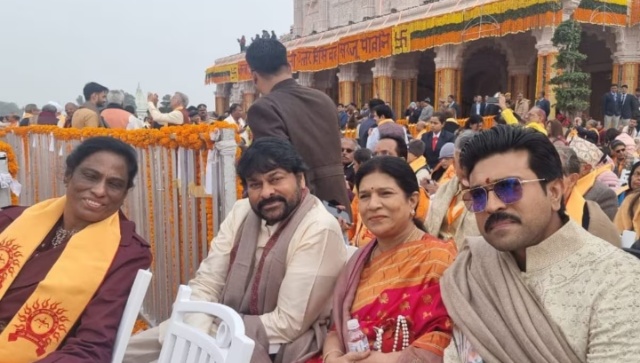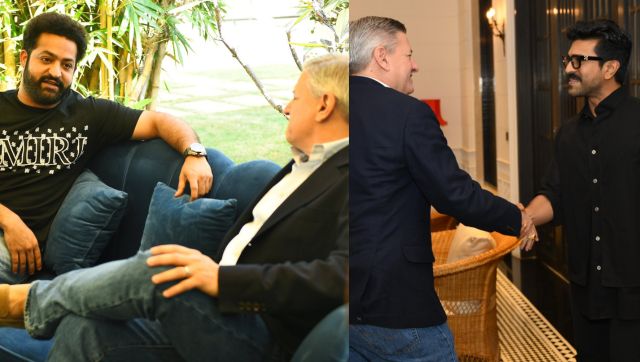The Telugu actor Chiranjeevi is among the scores of film stars and other celebrities who entered politics in the past decade. To say the least, his political career has been a disappointment.
Chiranjeevi the star, on the other hand, is another matter altogether. That Chiranjeevi — Megastar and Boss as he is known in fan circles — is now back with Khaidi No 150, a well-made and thoroughly enjoyable film. In the past decade, he was seen on screen in just two cameo appearances in films starring his actor son Ram Charan. For generations of film buffs who have grown up (or old, as the case may be) watching Chiranjeevi dance, fight and emote, this is a moment of pure joy. Early reports indicate the latest Chiranjeevi film had a strong opening in India and North America.
In Khaidi No 150, Chiranjeevi is featured in the dual role of Shankar, a hydrologist-turned-activist and “Kaththi” (meaning knife) Seenu, a prisoner on the run. The routine of the double, with one of the two characters being a recognisably “mass” (lower class but also vulgar) role, is a well-established feature of Chiranjeevi’s earlier work. Chiranjeevi as Kaththi Seenu reminds viewers of his memorable performances in similar roles from Donga Mogudu (1987) all the way up to Andarivadu (2006). In fact, the film is packed with quotations of the star’s earlier work, starting from the title, which recalls the movie that launched Chiraneevi into stardom (Khaidi, 1983). Among other references to the star’s oeuvre is the “veena step” from the more recent Indra (2002).
For the thousands of fans’ associations of the star, there is another reason for getting fired up. Telugu cinema websites point out that this is the 9th time that the Megastar’s Sankranti release is pitted directly in competition with a Balakrishna film (yes, there are people tracking these occasions). Balakrishna’s latest offering is the historical film Gautamiputra Satakarni, released just a day after the Chiranjeevi vehicle last week. Balakrishna, son of former Chief Minister NT Rama Rao and Chiranjeevi’s closest competitor in the 1980s and 1990s, is now a Telugu Desam Party MLA.
In fan circles and beyond, the competition between these stars had, in the past, been dramatised as a serialised battle between two “dynasties” (basically, their extended families, which include several other actors). This Sankranti, according to an estimate, film business worth 180 crore rupees is at stake. Much of this amount is to be earned, or lost, from the Chiranjeevi and Balakrishna vehicles. The very act of choosing one star/film over the other might acquire social and political significance, because the actors belong to different castes (Chiranjeevi is Kapu and Balakrishna Kamma) and political parties.
Political pundits have predicted that Khaidi No 150 is part of a larger plan of Chiranjeevi to re-launch his political career. It is inevitable that this film will be closely scrutinised for political messages and be the subject of much speculation. This, in spite of the fact that it is a faithful remake of the Tamil hit Kaththi (AR Murugadoss, 2014) and is not custom-designed to address issues in Andhra politics.
But there is no stopping anyone from reading it as an attack on the state government or a comment on Chiranjeevi’s own political career. Such readings are by now a matter of habit for the media and viewers alike. For a decade and a half before the launch of Praja Rajyam Party (in 2008), Chiranjeevi’s films were interpreted as stepping stones to a political career, regardless of his own intentions. This is in part due to Chiranjeevi’s close association with the mass film from the 1980s. The mass film is the film industry’s name for highly formulaic, big-budget spectaculars, featuring major stars who are often but not always cast in the roles of lower class/caste characters. The mass film conflates the star and characters he plays. A typical mass film packs in a web of references to the star’s life and earlier films, inviting viewers to erase the distinctions between the two at certain points in the narrative.
For Chiranjeevi, what was once an attribute of the formula is proving to be a fraught with risk. Coming as it does after what an English newspaper cruelly called his “flop show in parliament”, Khaidi No 150 is being subjected to a reality check of an unusual kind. For example, a news website wants to know what the star has done so far for farmers, whose plight is touchingly foregrounded in this film. Social media memes attacking Chiranjeevi for his silence on farmers’ issues while he was a minister are being circulated. These attacks could well be handiwork of fans of Balakrishna and other stars, or supporters of the ruling Telugu Desam Party. These are also unfair questions and criticisms of film actors, whose mandate is, at best, to weave fantasies that foreground popular discontent and nurture hope and aspirations. But then, this is no ordinary actor. His films are not just fodder for fantasy and idle speculation. He was a minister and continues to be a member of parliament. No conspiracy theory can ignore these facts.
Treating films as a form of propaganda may or may not help Chiranjeevi’s political career, which to be honest, can’t be in a worse shape than it is now. However, his film career can be seriously damaged by drawing parallels between filmic narratives and the acts of commission and omission of the star-politician. There is a real danger of the fiction falling apart: from the weight of political considerations that the actor brings to bear on it on the one hand and the insistence of viewers that he authenticate the fantasy with real world actions on the other.
As an admirer of Chiranjeevi, the quintessential mass hero, I hope this crisis too will pass. I would like to read the English tagline of the film, “Boss is Back,” as a hint that he will retire from politics and be back in films for good. I look forward to the day when he takes the cue from the character he played in Mutha Mestri (1993) to announce that he would rather be the mestri (foreman) of his viewers, than continue to be an also-ran politician. By doing so, he will not only reassure viewers anxious of losing him again, but will also silence those who read aloud his political progress report.
SV Srinivas is the author of Megastar: Chiranjeevi and Telugu Cinema after NT Rama Rao (Oxford University Press, 2009). He is a Professor at the Azim Premji University, Bengaluru.


)




)
)
)
)
)
)
)
)